【范文】高二英语模块六 Unit2 grammar教学案
book6 module2教学案

选修6模块2 Period 2: grammar主备人:备课时间:授课时间:学习目标:复习、掌握v-ing用法知识与技能:复习v-ing用法。
过程与方法:复习巩固情感态度与价值观:熟练作题技巧,乐于动手,动脑重难点:v-ing做状语的用法Step I: 课前回顾:请同学们认真研读翻译以下句子,注意画线部分在句子中所作成分。
1.Seeing is believing. 译:____________________________________________ ()Talking is easier than doing. 译:_______________________________________()2.Her job is washing and cooking. 译:___________________________________ ()My hobby is collecting stamps. 译:____________________________________()3She likes drawing very much. 译:_____________________________________ ( ) Mary is thinking of going back to New York. 译:__________________________ ( ) We found it no good talking like that. 译:_________________________________( ) 4T he sleeping child is only five years old. 译:______________________________( ) Do you know the man standing at the gate?译:_____________________________ ( ) 5We can see steam rising from the wet clothes. 译:__________________________ ( ) 6 He sat in the armchair, reading a newspaper. 译:___________________________ ( )归纳:v-ing 形式可以在句子中充当_________语、________语、_______语、_______语________语和_________语。
【高二】高二英语模块六 Unit2 grammar教学案
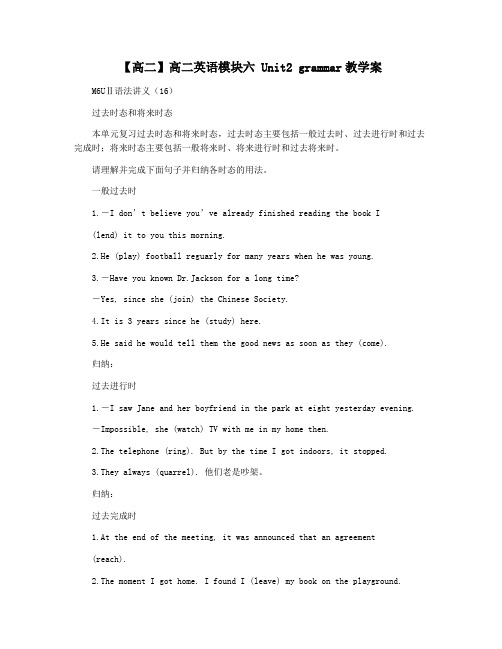
【高二】高二英语模块六 Unit2 grammar教学案M6UⅡ语法讲义(16)过去时态和将来时态本单元复习过去时态和将来时态,过去时态主要包括一般过去时、过去进行时和过去完成时;将来时态主要包括一般将来时、将来进行时和过去将来时。
请理解并完成下面句子并归纳各时态的用法。
一般过去时1.―I don’t believe you’ve already finished reading the book I(lend) it to you this morning.2.He (play) football reguarly for many years when he was young.3.―Have you known Dr.Jackson for a long time?―Yes, since she (join) the Chinese Society.4.It is 3 years since he (study) here.5.He said he would tell them the good news as soon as they (come).归纳:过去进行时1.―I saw Jane and her boyfriend in the park at eight yesterday evening.―Impossible, she (watch) TV with me in my home then.2.The telephone (ring). But by the time I got indoors, it stopped.3.They always (quarrel). 他们老是吵架。
归纳:过去完成时1.At the end of the meeting, it was announced that an agreement(reach).2.The moment I got home. I found I (leave) my book on the playground.3.We (think) to r eturn early but they wouldn’t let us go.归纳:一般将来时一般将来时可以用will/ shall+动词原形,be going to +动原,还可以用。
高二英语选修6 Module 2 语法教案

Module 2 Fantasy Literature—Philip PullmanGrammar—Adverbial clauses with –ing (1)GoalsTo learn to understand and use adverbial clauses with –ing (1)●Procedures▇ Learning about adverbial clauses with –ingAdverbial clauses with –ing can be used either independently or after a word such as on, before, after and while.Look at the following examples containing adverbial clauses with –ing and make similar sentences.▲Feeling hungry, he went into the kitchen and opened the fridge.(= because he felt hungry...)▲Being poor, he didn't spend much on clothes.▲Knowing that his mother was coming, he cleaned the flat.▲Looking out of the window, I saw some students playing there.▲Not having received his letter for long, she felt a little worried.▲Being treated, the injured cried all the time.▲Mounting(骑上) his horse, the bandit(土匪) rode off.▲David was lying in bed crying.▲We walked along the banks singing merrily.▲Having written the letter, I went out to post it.▲Having already seen the film twice, she didn't want to go to the cinema.▲Having been invited to speak, I'll start making preparations tomorrow.▲He did poorly in his examinations, considering how hard he had studied for them.▲Generally speaking, boys are more interested in such activities that girls are not interested in.▲Allowing for the deficiencies(不足), the show is a success.▲Being a student, she likes to help others.▲Wearing a new pair of glasses, she can read easily.▲Not knowing what to do next, she stopped to wait.▲Not having finished the homework, the pupil doesn't dare to go to school.▲Being sick, I stayed at home.▲Realizing that she couldn’t move the heavy box, she asked me to help her.▲Looking out of the window, I saw some students playing there.▲Having done my shopping, I returned home.▲Being League members, we are ready to help others.▲Not knowing his address, I can’t write to him.▲Not having received his letter for long, she felt a little worried.▲Working hard, you’ll surely succeed.▲On seeing the man, the woman at once falls in love with him.▲Before going to school in the morning, he called his father on the phone.▲While lying by a river, Xiao Li saw a strange bird.▲After reading the article, he decided not to buy the house.■Making sentences containing adverbial clauses with –ingNext you are going to turn sentences from the text The Cat That V anished into sentences containing adverbial clauses with –ing.The Cat That vanished1.Standing quiet,Will could not think clearly.2.Trying to decide what to do,he saw a cat.ing out of a garden, Will put down his shopping bag.4.Holding out its hand, the cat came up to the tiger.5.Before turning away he went across the road.6.Stopping there, still watching,Will saw the cat behave strangely.7.Putting out a paw to pat something in the air in front of her,the cat turned invisible to all thepeople.8.While leaping back,the cat held up her tail.9.Not knowing about the cat behaviour Will watched more carefully.10.After approaching the place again, Will found it was just an empty patch of grass between thetrees and the bushes.11.Patting the air once more, she leapt back,but less far and with less fear this time.12.After stepping forward,the cat became vanished again.13.Blinking, he stood still,close to the nearest tree.14.Passing by a lake, the car suddenly ran into a truck.15.Keeping her eyes on him, the girl climbed through the hole in the walls.■Doing a quiz on adverbial clauses with –ing①(2003北京)________ time , he’ll make a first—class tennis player.A. Having givenB. To giveC. GivingD. Given②(2000上海)_________ in 1636, Harvard is one of the most famous universities in the in the United States.A. Being foundedB. It was foundedC. FoundedD. Founding③_______a reply, he decided to write again. ( 92 )A. Not receivingB. Receiving notC. Not having receivedD. Having not received④―We can’ go out in this weather,‖said Bob , ____ out of the window.( 04 四川吉林)A. lookingB. to lookC. lookedD. having looked⑤(NMET1996)______ in thought, he almost ran into the car in front of him.A. LostB. Being lostC. To loseD. To be lost⑥(2003北京春)Mr. Smith, _____of the _____speech, started to read a novel.A. tired; boringB. tiring; boredC. tired; boredD. tiring; boring⑦(2004上海春)After his journey from abroad, Richard Jones returned home, ____.A. exhaustingB. exhaustedC. being exhaustedD. having exhausted⑧(NMET 2002) The research is so designed that once _______ nothing can be done to change it.A. beginsB. having begunC. beginningD. begun⑨(上海1998)If _______ the same treatment again , he is sure to get well.A. givingB. giveC. givenD. being given⑩(2003上海春) Unless ______ to speak, you should remain silent at the conference.A. invitedB. invitingC. being invitedD. having invited(keys: 1-5:DCCAA;6-10:ABDCA)。
高二英语Module6 Unit2教案
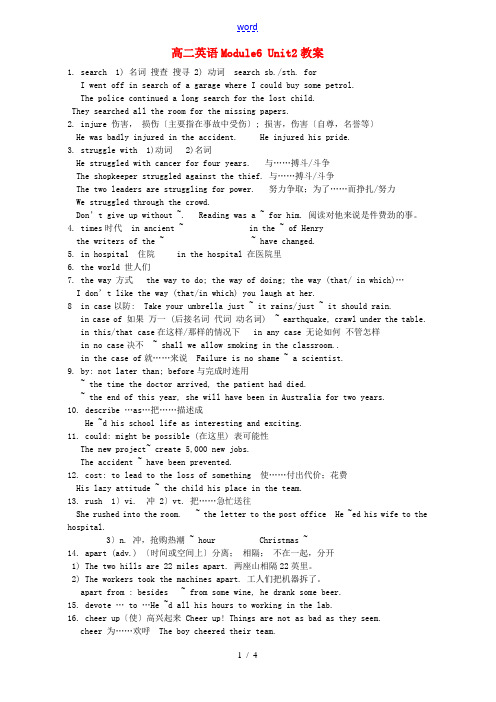
高二英语Module6 Unit2教案1. search 1) 名词搜查搜寻 2) 动词 search sb./sth. forI went off in search of a garage where I could buy some petrol.The police continued a long search for the lost child.They searched all the room for the missing papers.2. injure 伤害,损伤〔主要指在事故中受伤〕; 损害,伤害〔自尊,名誉等〕He was badly injured in the accident. He injured his pride.3. struggle with 1)动词 2)名词He struggled with cancer for four years. 与……搏斗/斗争The shopkeeper struggled against the thief. 与……搏斗/斗争The two leaders are struggling for power. 努力争取;为了……而挣扎/努力We struggled through the crowd.Don’t give up without ~. Reading was a ~ for him. 阅读对他来说是件费劲的事。
4. times时代 in ancient ~ in the ~ of Henrythe writers of the ~ ~ have changed.5. in hospital 住院 in the hospital 在医院里6. the world 世人们7. the way 方式 the way to do; the way of doing; the way (that/ in which)…I don’t like the way (that/in which) you laugh at her.8 in case以防: Take your umbrella just ~ it rains/just ~ it should rain.in case of 如果万一 (后接名词代词动名词) ~ earthquake, crawl under the table.in this/that case在这样/那样的情况下 in any case 无论如何不管怎样in no case决不 ~ shall we allow smoking in the classroom..in the case of就……来说 Failure is no shame ~ a scientist.9. by: not later than; before与完成时连用~ the time the doctor arrived, the patient had died.~ the end of this year, she will have been in Australia for two years.10. describe …as…把……描述成He ~d his school life as interesting and exciting.11. could: might be possible (在这里) 表可能性The new project~ create 5,000 new jobs.The accident ~ have been prevented.12. cost: to lead to the loss of something 使……付出代价;花费His lazy attitude ~ the child his place in the team.13. rush 1〕vi. 冲 2〕vt. 把……急忙送往She rushed into the room. ~ the letter to the post office He ~ed his wife to the hospital.3〕n. 冲,抢购热潮 ~ hour Christmas ~14. apart (adv.) 〔时间或空间上〕分离;相隔;不在一起,分开1) The two hills are 22 miles apart. 两座山相隔22英里。
人教版高中英语选修6 Unit2 Grammar名师教学设计
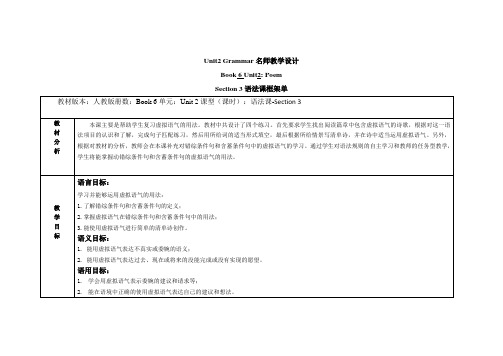
1. Teacher elicits the definition of subjunctive mood in complex sentences by asking Ss to translate the sentences and summarize the rules about it.(5 mins)
If it had not been for your suggestions,I would not get such a good job now.
If you'd listened to me, you wouldn't be in such trouble now.
S: Translate the two sentences and tell the rules implied in the complex sentences.
1.学会用虚拟语气表示委婉的建议和请求等;
2.能在语境中正确的使用虚拟语气表达自己的建议和想法。
策略目标:
1.能通过自主学习观察语法规则,并进行总结归纳一般规律;
2.能通过合作学习与同伴交流,学习同伴经验和学习方法,摸索自己的语法学习方法;
文化目标:
1.学会西方用虚拟语气表达真实情感的文化意义;
2.通过谈论从失败经历中汲取的教训,体会西方文化中的个人英雄主义和东方文化中的集体主义精神;
教
学
目
标ቤተ መጻሕፍቲ ባይዱ
语言目标:
学习并能够运用虚拟语气的用法:
1.了解错综条件句和含蓄条件句的定义;
2.掌握虚拟语气在错综条件句和含蓄条件句中的用法;
3.能使用虚拟语气进行简单的清单诗创作。
语义目标:
1.能用虚拟语气表达不真实或委婉的语义;
高二英语教案:牛津版高二英语模块6unit 2教案3

Unit 2 What is happiness to you?Part One Teaching Design第一部分教学设计Aims and requirements♦ Read an interview and two essays about happiness♦ Listen to friend talk about problems and solutions♦ Talk about the gymnast Sang Lan♦ Write an article for a website offering adviceProcedures●Welcome to the UnitStep 1: BrainstormingA flash appreciationBoys and girls, good morning (good afternoon). Are you in a good mood today? Let’s enjoy a flash together. What kind of sports can you see in the picture? How do you find the flash?(In the flash, we can see people of different ages take weightlifting exercise and some funny or interesting mistakes or accidents happen during the course of exercise. They make us burst into laughter)Picture-talkingWhat are people doing in each picture? How do they feel? (excited, happy, thrilled) What is the definition of happiness? What are the things that make one happy?Different people have different understanding of happiness. To some people, it means an easy life, a good job, money; to some, it may be helping others, contributions to one’s country......How do you understand happiness? What are your hobbies? And what do you do when you feel unhappy?Step 2: Sharing informationOpen your books to Page 17. Let’s share information about each picture on this page with each other.1. Study the six picturesPicture 1 Being creativeDo you like drawing? When and how did you begin to develop this interest?What does this hobby bring to you? (Whenever I feel upset and want to escape from everything, I like to go into my bedroom and take up my paints and brushes. It's so wonderful--all my thoughts and ideas can be expressed in my pictures.)What other things mean 'being creative' to you? (Thinking of different solutions to solve problems, expressing myself in my own ways and making new things.)Picture 2 Doing exciting thingsWhat are exciting things to you? (like white-water surfing or bungee jumping.) Why do peoplelike exciting things? They bring lots of fun and help people forget all the troubles and worries. Picture 3 ReadingDo you like reading? Does reading make one happy? Why? It is really enjoyable when reading especially in a peaceful and quiet environment. Sometimes we are so absorbed by the characters in the book and their stories that we forget all about the outside world. Through reading, we gain knowledge and our horizons are broadened.Picture 4 Playing sportWhich are your favorable sports? It's a really good way to make friends, keep fit and relax. Picture 5 Spending time with familyDo you enjoy spending time with your family? When you feel happy or unhappy, do you talk to them about your problems and achievements? Family is important to everyone. It's a perfect time to talk to your family about your problems. They can give you good advice and make you confident. They are also happy for the achievements you made.Picture 6 Learning new thingsHave you ever been to a natural history museum? Why do people like museum? In a museum, we can find out more information than we can just through reading books. Visiting these kinds of places can give us a real insight into history.What other ways do you think may help you learn more new things? (Surfing the Internet and talking to different people.)2. Talk about each picture and exchange opinions with your partner.Which things do you often do and like to do? Why do you feel happy when doing these?Step 3: DiscussionWork in groups of 4 to discuss the three questions and then report the answers to the whole class.1. What are things that make everyone happy?There are some things in life that make us feel happy. For example, as a small child, something as simple as getting some sweets is enough to make him or her into a happy child. As a student, passing an exam can make him or her feel on top of the world. For an adult, getting a great new job or traveling to different parts of the world are some of the happiest times.2. What are the things which make you happy?Eating a hearty meal, getting some new clothes, having enough money for something I really want, reading a great book, watching a really good film, making a new friend or making up with my friends after an argument.3. If you had a friend who was unhappy, how would you try to help him or her?In this case, I will try to be a good listener and understand what has made him or her so upset. Offer some advice if necessary. Invite him to go outside for a walk or go shopping together to cheer him upStep 4: HomeworkRead the two articles on P112-113.Prepare the reading part.●Reading The search for happinessStep 1: Lead-inLet’s enjoy a video. It can make us feel very happy and in good mood. And we can see most ordinary healthy people around us live a happy, meaningful and colourful life. We work and live with smiles every day. But how do you know disabled people stay happy in their life? Today we are going to talk about a special girl named Sang Lan, who used to be a successful gymnast. What do you know about this girl?1. Different people find happiness and fun in different things. There are certainly no criteria assessing which way of being happy is the best. Do you think Sang Lan had had a happy life before she was injured?Do you think Sang Lan has a happy life now?What would you do if you had the same problem?2. Suppose you had a chance to talk face to face with Sang Lan, what would you like most to ask her about?The following are suggested answers:--- childhood and school education--- things or experiences that had left her the deepest impression before the accident--- reasons for learning gymnastics--- things that encourage her during hard times--- current physical condition--- expectations for future--- future career plans--- attitudes towards life, success and failureStep 2: Fast reading for general ideasThe reading text is an interview from a TV programme about happiness. Dr Brain, a psychologist who studies happiness, is interviewed in a television talk show and tells a story about a brave girl called Sang Lan.Answers1. Happiness2. Dr Brain.3. In Ningbo, China in 1981.1. Read the passage again and complete Part C1. Questions in Part C1 are to check your reading comprehension by making correct judgments of the statements.2. Listen to the tape and complete C2. Questions in Part C2 are for students to note some specificMore relevant information in the interview which shows Sang Lan ’s personalityBefore going to hospital· being successful in her sport when she was young· being described as energetic, happy and hard-working·working towards something special· trying to make her parents proudWhile staying in hospital·being in good spirits·thinking about what she could do to get better·being proud of the things she had accomplished·feeling happy to be alive, and lucky to have the rest of her life to learn new thingsAfter leaving hospital·studying journalism at Beijing University·hosting a sports show about the 2008 Beijing Olympics·looking forward to playing table tennis in the special Olympics for disabled people in 2008·thinking about positive things and staying optimistic·believing that keeping busy helps her stay positiveStep 4: Practice1. Complete Part DFind these words and expressions in the interview. Guess their meanings from the context. Thenmatch them with the correct definitions.2. Complete Part ERead this newspaper article about Sang Lan. Complete it with the words below.3. Let’s read the Reading strategy on page 19. Do you know what an interview means? An interview is a formal meeting at which one person asks another person a series of questions on a topic. When reading or watching an interview, you should pay attention to the topic, the opinions related to the topic, the questions asked and the answers to the questions.Step 5: Post-reading activitiesThink about the following questions again.What is happiness?What is the real value of being alive?Does being healthy and wealthy mean happiness?Does being respected and well-liked mean happiness?2. Have a debate. The topic is “Sang Lan was happier before the accident than she is now.”3. Go over Part F in pairs and continue the dialogue after the example.Step 6: Language Points1. Finish Parts A1 and A2 on page 108 in Workbook.2. Go over the reading passage.●Word powerStep 1: BrainstormingIn this section we’ll learn the words and idioms used to describe emotions and feelings. Now I’d like you to answer the following questions:What words do you know can express happiness?Apart from happiness, what other types of emotions do you know?Can you think of some words that can express these kinds of feelings?(love joy excitement hate fear jealousy delight surprise astonishment frustration depression contentment satisfaction concern worry fury curiosity ) Step 2: Vocabulary learning1. Read the instructions on page 22 and study the examples listed in the table.2. Write the adjective forms of other nouns related to emotion.ReferenceNouns Adjectivesastonishment astonisheddelight delightedfury furiouscuriosity curioussatisfaction satisfieddepression depressedamazement amazeddisappointmemt disappointedStep 3: Practice1. Let’s focus on Part A. Circle the right word according to each different situation.Step 4: CompetitionHow many emotional words do you know? Now I’ll divide you into several groups. You’ll have a competition to see which group has the most words. In the end you need to group emotional words into three different categories: happiness, sadness and anger.·Words describing happiness:Noun forms: joy, happiness, delightAdjective forms: joyful, happy, delighted·Words describing sadness:Noun forms: sadness, depressionAdjective forms: sad, depressed·Words describing anger:Noun forms: anger, furyAdjective forms: angry, furiousStep 5: Vocabulary extension1. Choose the correct word to complete each sentence.①I'm not_____(satisfied, satisfaction) with what I've done. I can't get_____ (satisfied, satisfaction) from it. (satisfied; satisfaction)②I was _____ (amazed, amazement) by the change in his appearance. All of us looked at him in_____ (amazed, amazement). (amazed; amazement)③The boy is _____ (curious, curiosity) about everything. His burning_____ (curious, curiosity) inspires him to learn more. (curious; curiosity)2. Do part C. In the English language, there are some idioms about emotions. Guess their3. Reading comprehensionThere are some very good things about open education. This way of teaching allows the students to grow as people, and to develop their own interests in many subjects. Open education allows students to be responsible for their own education, as they are responsible for what they do in life. Some students do badly in a traditional classroom. The open classroom may allow them to enjoy learning. Some students will be happier in an open education school. They will not have to worry about grades or rules. For students who worry about these things a lot, it is a good idea to be in an open classroom.But many students will not do well in an open classroom. For some students, there are too few rules. These students will do little in school. They will not make good use of open education. Because open education is so different from traditional education, these students may have a problem getting used to making so many choices. For many students it is important to have some rules in the classroom. They worry about the rules even when there are no rules. Even a few rules will help this kind of students. The last point about open education is that some traditionalteachers do not like it. Many teachers do not believe in open education. Teachers who want to have an open classroom may have many problems at their schools.You now know what open education is. Some of its good points and bad points have been explained. You may have your own opinion about open education. The writer thinks that open education is a good idea, but only in theory. In actual fact, it may not work very well in a real class or school. The writer believes that most students, but of course not all students, want some structure in their classes. They want and need to have rules. In some cases, they must be made to study some subjects. Many students are pleased to find subjects they have to study interesting. They would not study those subjects if they did not have to.1. Open education allows the students to ___________ .A. grow as the educated B.be responsible for their futureC. develop their own interests D.discover subjects outside class2. Open education may be a good idea for the students who__________.A.enjoy learning B.worry about gradesC.do well in a traditional classroom D.are responsible for what they do in life.3. Some students will do little in an open classroom because_________ .A.there are too few rules B.they hate activitiesC.open education is similar to the traditional education D.they worry about the rules 4. Which of the following is NOT mentioned in the passage?A.Some traditional teachers do not like it.B.Many teachers do not believe in open education.C.Teachers may have problems in open classrooms.D.The teacher’s feelings and attitudes are important to the students.5. Which of the following best summarizes the passage?A.Open education is a really complex idea.B.Open education is better than traditional education.C.Teachers dislike open education.D.The writer thinks that open education is a good idea in practice.Step 6: HomeworkPart C on page 114 in the Workbook.Prepare Grammar and usage.●Grammar and usageStep 1: General introduction and explanation to past and future tensePast tenseI. The simple past tense:It is often used to talk about something that happened in the past and is now finished.e.g. She worked late into night yesterday.II. The past continuous tense:The tense is to talk about something that happened in the past and continued for some time. e.g. She knew that as a famous dancer she was making her parents proud in those years.III. The past perfect tense:1. The past perfect tense is often used with the simple past tense. If one action happens beforeanother in the past, the past perfect tense is used.e.g. Upon entering the tomb, Carter’s lucky pet bird , which had led him to the place, was eaten by a snake.2. The past perfect tense is sometimes used in reported speeche.g. “We emptied the tomb of everything it contained,” said Carter.Carter said that they had emptied the tomb of everything it contained.3. The use of the past perfect tense simply indicates that an action comes before another past action, used with time expressions such as when, after, before, as soon as, until, by, for and alreadye.g. I had done my homework this morning before I went to the museum.Future tenseI. The form and usage of the simple future tense:1. will/shall do:表示将来发生的动作或出现的状态,shall仅与第一人称连用2. be going to do:表示主语计划打算的行动或看来就要发生的事情3. be doing:表示计划或安排好的动作(go, come, leave, begin 等动词)4. be to do:表示客观上计划或安排好的动作5. be about to do:表示即将发生的动作,一般不带时间副词或短语6. do:表示与安排,计划或时刻表有关的动作;或用于if, when等状语从句中代替will do. II. The usage of the future continuous tense:1. Talk about something that will be in progress at a certain time or over a period of time in the future. (讨论将来某个时间点或时间段正在进行的动作)e.g. Toby will not be in London next Tuesday. He will be climbing in the Himalayas.Toby will be climbing in the Himalayas all next week.Express future without intention. When it is used in this way, we want to indicate that something will happen naturally. It doesn’t imply that the speaker has arranged the action.(表示不包含说话者主观意愿的纯粹将来。
高中英语选修六《Unit 2 Grammar and usage(2)》教案

The basic usage ofnon-finite verbused as adverbials
难点
How to use propernon-finite verbused as adverbials
教法及教具
Teaching
教
学
过
程
教学内容
个案调整
教师主导活动
学生主体
活动
Step 1True or false
3).______________(work)hard, you will succeed one day
4)Posy went into the room,____________(follow)by his fans.
5)Mo Yan won the Nobel Prize in Literature,___________
7. to be frank, to tell you the truth, to make matters worse.
e.g.:
①__________________(一般说来), boys are more interested in such activities than girls.
②_______________her accent(从口音判断), She must be from Henan.
a well-known athlete;
Summary:
独立结构:逻辑主语+doing/done
Paraphrase these sentences:
1).If time permits, I will call on you.
2).After my homework was finished, I could go to play outside.
高二英语模块六 Unit2 grammar教学案
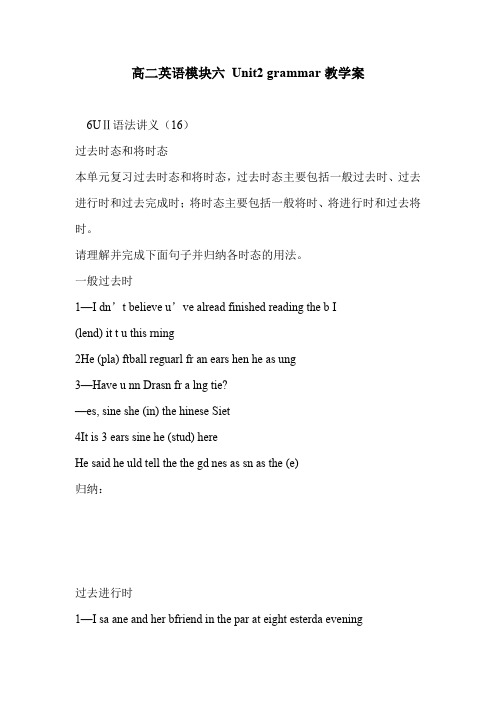
高二英语模块六Unit2 grammar教学案6UⅡ语法讲义(16)过去时态和将时态本单元复习过去时态和将时态,过去时态主要包括一般过去时、过去进行时和过去完成时;将时态主要包括一般将时、将进行时和过去将时。
请理解并完成下面句子并归纳各时态的用法。
一般过去时1—I dn’t believe u’ve alread finished reading the b I(lend) it t u this rning2He (pla) ftball reguarl fr an ears hen he as ung3—Have u nn Drasn fr a lng tie?—es, sine she (in) the hinese Siet4It is 3 ears sine he (stud) hereHe said he uld tell the the gd nes as sn as the (e)归纳:过去进行时1—I sa ane and her bfriend in the par at eight esterda evening—Ipssible, she (ath) TV ith e in he then2The telephne (ring) But b the tie I gt indrs, it stpped3The alas (quarrel) 他们老是吵架。
归纳:过去完成时1At the end f the eeting, it as annuned that an agreeent(reah)2The ent I gt he I fund I (leave) b n the plagrund3e (thin) t return earl but the uldn’t let us g归纳:一般将时一般将时可以用ill/ shall+动词原形,be ging t +动原,还可以用。
模块6 Unit 2 教学案(学生版)(译林牛津版高二英语选修六学案设计)

M6 unit 2 (Part I )Welcome to the unit1. make sb/sth + adj (P17)He has a strange way of_making_his classes lively and interesting.make 后面还可以跟名词/do/done 及介词短语作宾语补足语He made him_captain_of the football team.(队长)若名词为表示头衔职位的词,则名词前不用冠词。
E.g.Bush was made President of the USA again in 2004.We don’t need to make him learn.The waste put into the river makes the river __polluted_(污染)He was made at a loss at the question.Words from Reading to Word power1. search sb/sp 在…搜查,在…搜索 (P18标题)The guard searched every corner of the room.士兵搜查了房间的每个角落。
He was afraid that he might be searched because he had the letter to the Party. search for sth /sbThey searched for the lost child everywhere.The police searched everyone for anything banned.警察在每个过路人身上搜寻禁带品。
The enemy _ searched_ the mountain for the wounded.敌人搜山寻找伤员。
search n. 搜查,搜索in search of/ in one’s search for/ in the search forThey went out in search of a cheap hotel.A search _for_ the missing aircraft is already going on.人们正在搜寻那架失控的飞机。
高中英语选修六:Unit2+Poems+Grammar+教案2
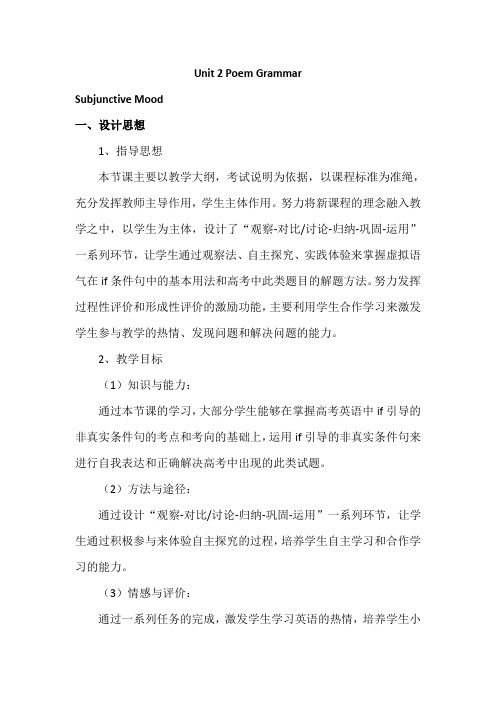
Unit 2 Poem GrammarSubjunctive Mood一、设计思想1、指导思想本节课主要以教学大纲,考试说明为依据,以课程标准为准绳,充分发挥教师主导作用,学生主体作用。
努力将新课程的理念融入教学之中,以学生为主体,设计了“观察-对比/讨论-归纳-巩固-运用”一系列环节,让学生通过观察法、自主探究、实践体验来掌握虚拟语气在if条件句中的基本用法和高考中此类题目的解题方法。
努力发挥过程性评价和形成性评价的激励功能,主要利用学生合作学习来激发学生参与教学的热情、发现问题和解决问题的能力。
2、教学目标(1)知识与能力:通过本节课的学习,大部分学生能够在掌握高考英语中if引导的非真实条件句的考点和考向的基础上,运用if引导的非真实条件句来进行自我表达和正确解决高考中出现的此类试题。
(2)方法与途径:通过设计“观察-对比/讨论-归纳-巩固-运用”一系列环节,让学生通过积极参与来体验自主探究的过程,培养学生自主学习和合作学习的能力。
(3)情感与评价:通过一系列任务的完成,激发学生学习英语的热情,培养学生小组合作意识,提高互助学习,互相帮助的意识。
将过程性评价和形成性评价有效的结合起来,发挥其激励功能。
(4)现代教学手段:多媒体课件和导学案3、教学重点与难点(1)教学重点:高中英语语法教学中,虚拟语气作为高考常考的语法项目之一,主要考查if引导的非真实条件句。
同时,if既可引导真实条件句,又可引导非真实条件句,学生容易混淆该语法知识。
因此,本节课的教学重点是引导学生学习和掌握if引导的非真实条件句的基本结构和用法。
(2)教学难点:使学生能够充分地掌握if引导的非真实条件句的考点考向,并能运用if引导的非真实条件句来进行自我表达和正确解决高考中出现的此类试题。
二、教学准备本节课的教学目标是帮助学生掌握if引导的非真实条件句的基本结构和用法,提高学生的英语知识综合运用能力。
在进行教学设计时,我首先学习了《2015年普通高等学校招生全国统一考试大纲的说明》、《普通高等学校招生全国统一考试》陕西卷英语考试说明,以及新课标对于该语法知识的要求,以使自己在正确理念和要求的指导下进行备课。
高二英语译林版选修6教案:Unit2(语法)含解析

英语译林牛津版选修6Unit2同步教案(语法)The simple past tense1)在确定的过去时间里所发生的动作或存在的状态。
时间状语有:yesterday, last week, an hour ago,the other day,in 1980 等。
Eg。
I saw Tom in the street yesterday.2)表示在过去一段时间内,经常性或习惯性的动作。
Eg. When I was a child,I often played football in the street.3)用过去时表示现在,表示语气委婉礼貌.( 1。
)动词want,hope, wonder,think,intend 等。
Eg。
Did you want anything else?(2。
)情态动词could,would,Eg。
Could you lend me your bike?4)用在条件句中表示与现在或将来事实不符的虚拟语气。
Eg。
If I were a bird,I would fly to Beijing.注意下列句型:◎It is time sb。
did sth。
“时间已迟了;早该……了”,Eg。
It is time you went to bed.◎would (had) rather sb。
did sth.表示“宁愿某人做某事",Eg. I'd rather you came tomorrow。
The past continuous tense1)过去进行时表示过去某一时刻或某一段时间正在进行的动作。
常与at that time ,the whole morning,all day yesterday, from nine toten last evening等连用。
Eg。
What was he doing this time yesterday?2.)过去进行时的主要用法是描述一件事发生的背景;一个长动作发生的时候,另一个短动作发生.My brother fell while he was riding his bicycle and hurt himself.The past perfect tense1)过去完成时表示过去某一时刻或者某一动作之前完成的动作或状态;句中常用by, before,until, when等词引导的时间状语.By the end of last year we had built five new houses。
模块6Unit2全单元语言点详备教学案(师生版)(译林牛津版高二英语选修六学案设计)
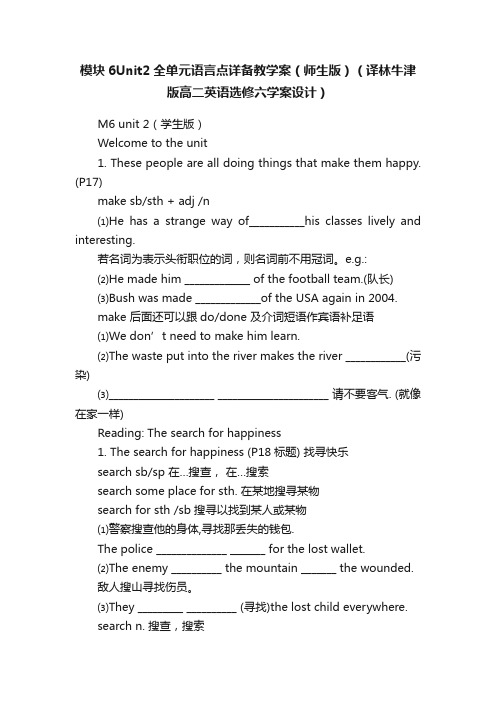
模块6Unit2全单元语言点详备教学案(师生版)(译林牛津版高二英语选修六学案设计)M6 unit 2(学生版)Welcome to the unit1. These people are all doing things that make them happy. (P17)make sb/sth + adj /n⑴He has a strange way of___________his classes lively and interesting.若名词为表示头衔职位的词,则名词前不用冠词。
e.g.:⑵He made him _____________ of the football team.(队长)⑶Bush was made _____________of the USA again in 2004.make 后面还可以跟do/done 及介词短语作宾语补足语⑴We don’t need to make him learn.⑵The w aste put into the river makes the river ____________(污染)⑶_____________________ ______________________ 请不要客气. (就像在家一样)Reading: The search for happiness1. The search for happiness (P18标题) 找寻快乐search sb/sp 在…搜查,在…搜索search some place for sth. 在某地搜寻某物search for sth /sb 搜寻以找到某人或某物⑴警察搜查他的身体,寻找那丢失的钱包.The police ______________ _______ for the lost wallet.⑵The enemy __________ the mountain _______ the wounded.敌人搜山寻找伤员。
高二英语第六Unit 2 教学案新人教版选修6
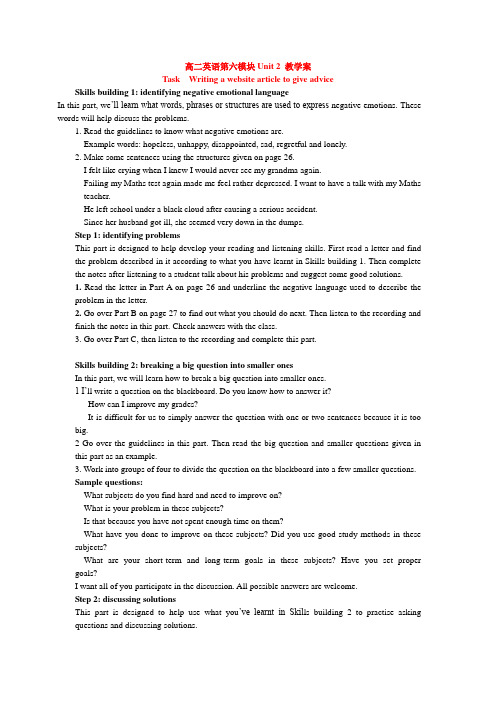
高二英语第六模块Unit 2 教学案Task Writing a website article to give adviceSkills building 1: identifying negative emotional languageIn this part, we’ll learn what words, phrases or structures are used to express negative emotions. These words will help discuss the problems.1. Read the guidelines to know what negative emotions are.Example words: hopeless, unhappy, disappointed, sad, regretful and lonely.2. Make some sentences using the structures given on page 26.I felt like crying when I knew I would never see my grandma again.Failing my Maths test again made me feel rather depressed. I want to have a talk with my Maths teacher.He left school under a black cloud after causing a serious accident.Since her husband got ill, she seemed very down in the dumps.Step 1: identifying problemsThis part is designed to help develop your reading and listening skills. First read a letter and find the problem described in it according to what you have learnt in Skills building 1. Then complete the notes after listening to a student talk about his problems and suggest some good solutions.1. Read the letter in Part A on page 26 and underline the negative language used to describe theproblem in the letter.2. Go over Part B on page 27 to find out what you should do next. Then listen to the recording andfinish the notes in this part. Check answers with the class.3. Go over Part C, then listen to the recording and complete this part.Skills building 2: breaking a big question into smaller onesIn this part, we will learn how to break a big question into smaller ones.1 I’ll write a question on the blackboard. Do you know how to answer it?How can I improve my grades?It is difficult for us to simply answer the question with one or two sentences because it is too big.2 Go over the guidelines in this part. Then read the big question and smaller questions given inthis part as an example.3. Work into groups of four to divide the question on the blackboard into a few smaller questions.Sample questions:What subjects do you find hard and need to improve on?What is your problem in these subjects?Is that because you have not spent enough time on them?What have you done to improve on these subjects? Did you use good study methods in these subjects?What are your short-term and long-term goals in these subjects? Have you set proper goals?I want all of you participate in the discussion. All possible answers are welcome.Step 2: discussing solutionsThis part is designed to help use what you’ve learnt in Skil ls building 2 to practise asking questions and discussing solutions.1. Work in pairs to discuss Ma Jie's problems. Try to divide the big question 'What do you think of Ma Jie's problem?' into smaller ones.Sample conversation--- You know Ma Jie is my good friend. Recently he has been worried a lot. I want to help him solve his problem. What do you think I should do?---OK. Let's see what we can do to help him, but first let's make things less complicatedWe'd better divide the big question into some smaller ones. Tell me what his problem is.2. Write down the smaller questions in speech bubble3.Work in pairs to make up a dialogue with the help of speech bubble 2 and speech bubble 3. Then two or three pairs are required to present your dialogues to the whole class.Skills building 3: giving adviceIn this part, you will read some guidelines of how to make advice clearer and more helpfulto people who need it.Read the three points and put on the blackboard the following table to help the students understand the guidelines.Step 3: writing an articleIn this part, you’ll write an article about how Ma Jie solved his problem with the help of his parents, teachers and coach.1 Read the guidelines in this part to find out what to do.·Ma Jie's problems·the possible solutions Ma Jie has thought of and the reasons why they didn't work·the advice you gave to Ma Jie·the advice his parents, teachers and coach gave him and why it works·your opinion about the best way to solve problems that students have2. Work in groups of four to write the article. Each member of the group writes one part. After each of you has finished your part, your group should put the four parts together to form the article and present it to the whole class.3. Homework: write a passage according the guidelines in Part B on page 115 in workbook.一、根据所给的首字母、中文意思或句子意思完成句子1. I am fed up with my current job, so I q_______.2. The city's water supply is no longer a__________ for its needs.3. The government has ________ (拨出) over £100 million to the job creation programme.4. She is good at French, so I ask her to c______ me in French.5. We have a__________ with them to meet at the restaurant.6. The little girl was very c________ by all the noise and activity.7. I have many beautiful post cards; choose w________ of them you like best.8. Soldiers are expected to o______ their officers without question.二、选用所给词或短语的正确形式填空2. The company ______________ the need to invest more money and the need to keep costs as low as possible.3. If you want to protect your lung, you'd better ____________ (smoke) right away.4. He always tells me such a story, and I _______________ it.5. I don't ___________ all these so-called health foods.6. The prisoners ____________ escape but failed.7. We must ____________ the question from all sides in order to have a better idea of it.8. When the exam is coming, many students are ______________ it.三、完形填空In 1956 Phoenix, Arizona, was a city with boundless blue skies. One day as I walked around the house with my sister Kathy’s new parakeet (小鹦鹉)on my finger, I wanted to show Perky 1 the sky looked like. Maybe he could make a little bird 2 out there. I took him into the backyard, and then, to my 3 , Perky flew off. The enormous(巨大的), blue sky swallowed up my sister’s blue 4 and suddenly he had gone , clipped wings and all.Kathy managed to 5 me. With fake optimism(乐观), she even tried to reassure (安慰)me that Perky would find a new 6 . But I was far too clever to 7 that such a thing was possible.Decades later, I watched my own 8 growing. We shared their activities, spending soccer Saturdays in folding chairs with the 9 of the kids’ friends, the Kissells. The two families went camping around Arizona together. We became the 10 of friends. One evening, the game was to tell Great Pet stories. One person claimed(宣称)to 11 the oldest living goldfish. Someone else had a psychic dog. 12 Barry, the father of the other family, took the floor and 13 that the Greatest Pet of All Time was his blue parakeet, Sweetie Pie."The best thing 14 Sweetie Pie," he said, "was the 15 we got him. One day, when I was about eight, out of the clear, blue sky, a little blue parakeet just 16 down and landed on my finger."When I was finally able to 17 , we examined the amazing evidence(证据). The dates and the locations and the pictures of the bird all 18 . It seems our two families had been 19 long before we ever met. Forty years later, I ran to my sister and said, "You were 20 ! Perky lived!"1. A. what B. how C. which D. where2. A. food B. nest C. friend D. family3. A. joy B. horror C. disappointment D. satisfaction4. A. pleasure B. sadness C. treasure D. sense5. A. forgive B. comfort C. help D. delight6. A. parent B. home C. master D. life7. A. imagine B. suppose C. doubt D. believe8. A. birds B. happiness C. worries D. children9. A. parents B. birds C. interests D. games10. A. first B. best C. last D. happiest11. A. catch B. find C. buy D. have12. A. Suddenly B. Fortunately C. Then D. However13. A. announced B. said C. told D. hoped14. A. in B. about C. of D. on15. A. day B. place C. way D. story16. A. floated B. dived C. settled D. went17. A. think B. speak C. interrupt D. explain18. A. came up B. turned up C. turned out D. matched up19. A. known B. fastened C. connected D. introduced20. A. right B. wrong C. silly D. mad四、书面表达假如你是南京某中学学生李华。
人教版高二英语选修6教案:Unit2+Poems+Period6.doc
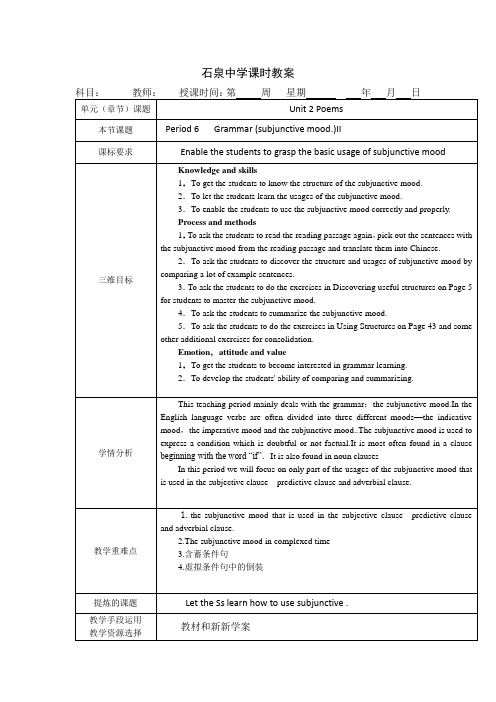
石泉中学课时教案品味人生1、不管鸟的翅膀多么完美,如果不凭借空气,鸟就永远飞不到高空。
想象力是翅膀,客观实际是空气,只有两方面紧密结合,才能取得显着成绩。
2、想停下来深情地沉湎一番,怎奈行驶的船却没有铁锚;想回过头去重温旧梦,怎奈身后早已没有了归途。
因为时间的钟摆一刻也不曾停顿过,所以生命便赋予我们将在汹涌的大潮之中不停地颠簸。
3、真正痛苦的人,却在笑脸的背后,流着别人无法知道的眼泪,生活中我们笑得比谁都开心,可是当所有的人潮散去的时候,我们比谁都落寂。
4、温暖是飘飘洒洒的春雨;温暖是写在脸上的笑影;温暖是义无反顾的响应;温暖是一丝不苟的配合。
5、幸福,是一种人生的感悟,一种个人的体验。
也许,幸福是你风尘仆仆走进家门时亲切的笑脸;也许,幸福是你卧病床上百无聊赖时温馨的问候;也许,幸福是你屡遭挫折心灰意冷时劝慰的话语;也许,幸福是你历经艰辛获得成功时赞赏的掌声。
关键的是,你要有一副热爱生活的心肠,要有一个积极奋进的目标,要有一种矢志不渝的追求。
这样,你才能感受到幸福。
6、母爱是迷惘时苦口婆心的规劝;母爱是远行时一声殷切的叮咛;母爱是孤苦无助时慈祥的微笑。
7、淡淡素笺,浓浓墨韵,典雅的文字,浸染尘世情怀;悠悠岁月,袅袅茶香,别致的杯盏,盛满诗样芳华;云淡风轻,捧茗品文,灵动的音符,吟唱温馨暖语;春花秋月,红尘阡陌,放飞的思绪,漫过四季如歌。
读一段美文,品一盏香茗,听一曲琴音,拾一抹心情。
8、尘缘飞花,人去楼空,梦里花落为谁痛?顾眸流盼,几许痴缠。
把自己揉入了轮回里,忆起,在曾相逢的梦里;别离,在泪眼迷朦的花落间;心碎,在指尖的苍白中;淡落,在亘古的残梦中。
在夜莺凄凉的叹息里,让片片细腻的柔情,哽咽失语在暗夜的诗句里。
9、用不朽的“人”字支撑起来的美好风景,既有“虽体解吾犹未变兮”的执着吟哦,也有“我辈岂是蓬蒿人”的跌宕胸怀;既有“我以我血荐轩辕”的崇高追求,也有“敢教日月换新天”的豪放气魄。
33 我是一只蜜蜂,在祖国的花园里,飞来飞去,不知疲倦地为祖国酿制甘甜的蜂蜜;我是一只紫燕,在祖国的蓝天上,穿越千家万户,向祖国向人民报告春的信息;我是一滴雨点,在祖国的原野上,从天而降,滋润干渴的禾苗;我是一株青松,在祖国的边疆,傲然屹立,显示出庄严的身姿。
外研版高二英语选修6_Module2_语法精品学案
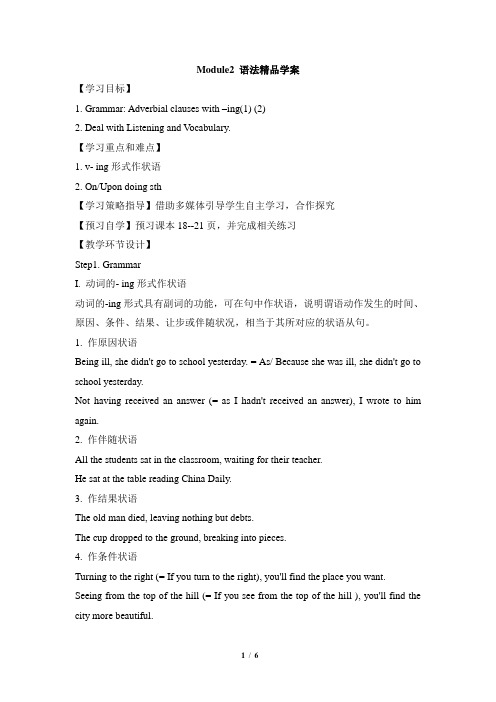
Module2 语法精品学案【学习目标】1. Grammar: Adverbial clauses with –ing(1) (2)2. Deal with Listening and V ocabulary.【学习重点和难点】1. v- ing形式作状语2. On/Upon doing sth【学习策略指导】借助多媒体引导学生自主学习,合作探究【预习自学】预习课本18--21页,并完成相关练习【教学环节设计】Step1. GrammarI. 动词的- ing形式作状语动词的-ing形式具有副词的功能,可在句中作状语,说明谓语动作发生的时间、原因、条件、结果、让步或伴随状况,相当于其所对应的状语从句。
1. 作原因状语Being ill, she didn't go to school yesterday. = As/ Because she was ill, she didn't go to school yesterday.Not having received an answer (= as I hadn't received an answer), I wrote to him again.2. 作伴随状语All the students sat in the classroom, waiting for their teacher.He sat at the table reading China Daily.3. 作结果状语The old man died, leaving nothing but debts.The cup dropped to the ground, breaking into pieces.4. 作条件状语Turning to the right (= If you turn to the right), you'll find the place you want. Seeing from the top of the hill (= If you see from the top of the hill ), you'll find the city more beautiful.5. 作时间状语Hearing the good news (= When he heard the good news ), he jumped with joy. Having finished his work (= After he finished his work), Henry went home.★小结:1. 若现在分词所表示的动作与谓语动作同时存在或同时发生,用现在分词的一般式(-ing); 若现在分词所表示的动作发生在谓语动作之前,则用现在分词的完成式(having done)。
人教版英语book6unit2grammarandusage虚拟条件句教案.doc
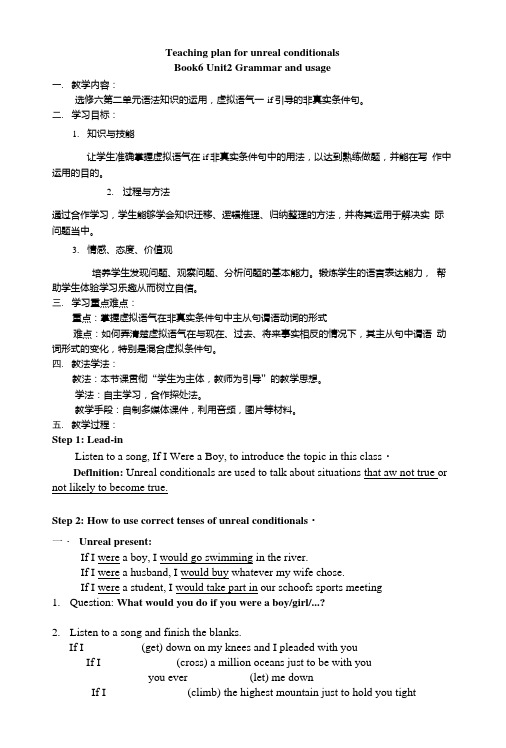
Teaching plan for unreal conditionalsBook6 Unit2 Grammar and usage一.教学内容:选修六第二单元语法知识的运用,虚拟语气一-if引导的非真实条件句。
二.学习目标:1.知识与技能让学生准确掌握虚拟语气在if非真实条件句中的用法,以达到熟练做题,并能在写作中运用的目的。
2.过程与方法通过合作学习,学生能够学会知识迁移、逻辑推理、归纳整理的方法,并将其运用于解决实际问题当中。
3.情感、态度、价值观培养学生发现问题、观察问题、分析问题的基本能力。
锻炼学生的语言表达能力,帮助学生体验学习乐趣从而树立自信。
三.学习重点难点:重点:掌握虚拟语气在非真实条件句中主从句谓语动词的形式难点:如何弄清楚虚拟语气在与现在、过去、将来事实相反的情况下,其主从句中谓语动词形式的变化,特别是混合虚拟条件句。
四.教法学法:教法:本节课贯彻“学生为主体,教师为引导”的教学思想。
学法:自主学习,合作探处法。
教学手段:自制多媒体课件,利用咅频,图片等材料。
五.教学过程:Step 1: Lead-inListen to a song, If I Were a Boy, to introduce the topic in this class・Deflnition: Unreal conditionals are used to talk about situations that aw not true or not likely to become true.Step 2: How to use correct tenses of unreal conditionals・一・Unreal present:If I were a boy, I would go swimming in the river.If I were a husband, I would buy whatever my wife chose.If I were a student, I would take part in our schoofs sports meeting1.Question: What would you do if you were a boy/girl/...?2.Listen to a song and finish the blanks.If I _________ (get) down on my knees and I pleaded with youIf I _____________ (cross) a million oceans just to be with you_________ y ou ever __________ (let) me downIf I ______________ (climb) the highest mountain just to hold you tightIf I said that I would love you every single night___________ you ever __________ (let) me down3.SummaryWe form present unreal conditionals like this:If clause (从句): ___________________________________ (be) (do)Main clause (主句): __________________________________二Unreal future:If I became/were to become/should become my grandfather tomorrow, I would give up smoking in no time.1.Speaking (pair work)A: What would you do first if you became /were to become/should become... tomorrow?B:IfI …A: What about you? What would you do if…B:IfI …2.SummaryWe fonn future unreal conditionals like this:If clause (从句): ___________________________________________Main clause (主句): _________________________________________三・Unreal past:1 • Watch a video Titanic and complete the exercises:e.g・ 1) The ship sank on its first voyage. About 1500 people lost their lives at that time.If the ship hadn't sunk on its first voyage, 1500 people wouldn't have lost their lives at that time.2)The captain of the ship was too confident and too proud.If the captain of the ship ________________ (be) too confident and too proud, the ship _________________ (sink) on its first voyage.3)The watchman was too careless.If the watchman ____________________ (be) too careless, the ship__________________ (strike) an iceberg.4)The ship struck an iceberg.If the ship____________ (strike) an iceberg, 1500 people__________________ (die) at that time.5)There weren't enough saving boats.If there_________ (be) enough saving boats, Jack_______________ (lose) his life.6)At last, the rescue workers came and saved Rose.If the rescue workers____________ (come), Rose______________________ (save).2. summary:We form past unreal conditionals like this:If clause (从句):__________________________________________Main clause (主句): _________________________________________3• Translation (Individual work)1 .如果Jack没有赢得票,他就不会登船(go on board)o2•如果Jack没有登上船,他就不会遇上Rose。
高二英语教案:牛津版高二英语模块6unit 2教案2

Module 6 Unit 2 What is happiness to you?Project Language points★It is nice to do sth.句型:It is/ becomes +adj. + to do sth. (it 为形式主语,动词不定式为真正主语) e.g. It is necessary for us to master a foreign language.精通一门外语,对我们来说是必要的。
It is necessary to get ready for the test.★look back on 回首;回忆;回顾e.g. 1) He used to sit there, looking back on his happy childhood.他过去常常坐在那里,回忆自己幸福的童年。
2) When he saw the old photos, he couldn’t help looking back on the days he spentwith his grandpa.当看到旧照片时,他情不自禁地想起跟爷爷一块儿度过的日子。
相关短语:look on/ upon …as…把……看作look out 当心,小心;留神look forward to 盼望look up 查阅;仰视;改善,好转★encouragement n. [U] the act of encouraging to do sth 鼓舞,激励;[C] sth. that encourages sb. 起激励作用的事物e.g. 1) Her words was a great encouragement to them.她的话对他们是极大的鼓舞。
2) With a little encouragement from his parents, he could have done better.父母给点激励的话,他会做得更好。
- 1、下载文档前请自行甄别文档内容的完整性,平台不提供额外的编辑、内容补充、找答案等附加服务。
- 2、"仅部分预览"的文档,不可在线预览部分如存在完整性等问题,可反馈申请退款(可完整预览的文档不适用该条件!)。
- 3、如文档侵犯您的权益,请联系客服反馈,我们会尽快为您处理(人工客服工作时间:9:00-18:30)。
高二英语模块六 Unit2 grammar教学案课件www.5yk m6UⅡ语法讲义(16)过去时态和将来时态本单元复习过去时态和将来时态,过去时态主要包括一般过去时、过去进行时和过去完成时;将来时态主要包括一般将来时、将来进行时和过去将来时。
请理解并完成下面句子并归纳各时态的用法。
一般过去时.—Idon’tbelieveyou’vealreadyfinishedreadingthebookIittoyouthismorning.2.Hefootballreguarlyformanyyearswhenhewasyoung.3.—HaveyouknownDr.jacksonforalongtime?—yes,sinceshethechineseSociety.4.Itis3yearssincehehere.5.Hesaidhewouldtellthemthegoodnewsassoonasthey.归纳:过去进行时.—Isawjaneandherboyfriendintheparkateightyesterdayeve ning.—Impossible,sheTVwithmeinmyhomethen.2.Thetelephone.ButbythetimeIgotindoors,itstopped.3.Theyalways.他们老是吵架。
归纳:过去完成时.Attheendofthemeeting,itwasannouncedthatanagree ment.2.ThemomentIgothome.IfoundImybookontheplayground.3.wetoreturnearlybuttheywouldn’tletusgo.归纳:一般将来时一般将来时可以用will/shall+动词原形,begoingto+动原,还可以用。
Heisgoingtoattendthemeeting.Itisgoingtobeafinedayforsurfingtomorrow.归纳:Themeetingistotakeplaceearlytomorrow.归纳:Don’tgoout.weareabouttohavedinner.归纳:将来进行时Danned’sfamilytheirholidayinHuangsharthistimenestweek.过去将来时.—Tom,youdidn’tcometothepartylastnight?—I.butIsuddenlyrememberedIhadhomeworktodo.2.Hesaidhemethenextday.归纳:某些固定句式中的动词的时态:.ItisthefirsttimethatI here. Itwasthethirdtimethathe thesamemistakes.2.HardlyIhomewhentheraindown.Nosoonerthesun itselfabovethehorizonthanhe outofbedtowork.3.It longbeforehesucceeds.It tenyearsbeforetheymetagain. Exercises:、用所给词适当的时态填空.AtthattimesheverygoodEnglish.2.Itomeetyouhere.3.Itwhentheyleftthestation.4.I’mafraidit.5.Thisropesoon.6.Theexhibitioninaweek.7.wetheruler.8.Bythistimetomorrow,I onthebench.9.Hesaidhethebook.0.Itoseeheragain.打靶演习.wehadhopedtocatchthe10:20train,but itwasgone.A.foundB.hadfoundc.wouldfindD.wouldhavefound2.Properfirstaidcansaveaseriouslyinjuredperson,espe ciallywhenheorsheisbleedingheavilyor.A.haspoisonedB.waspoisonedc.hasbeenpoisonedD.ispoisoning3.Sofarnothingclearaboutthemeeting.A.hasdoneB.hasbeendonec.hasmadeD.hasbeenmade4.-whathashappened?-ThewindowbutIhaven’tfoundoutwhoit.A.broke;brokeB.isbroken;hasbrokenc.isbroken;brokeD.hasbeenbroken;hasbroken5.Afterhehadbrokentheworldrecord,Rod toarestauranttocelebratewithhisfriends.A.wentB.hadgonec.wouldgoD.hasgone6.Theprisonsentencehereceived onthenumberofcrimeshehadcommitted.A.basedB.wasbasedc.hadbeenbasedD.wasbasing7.Iftheirmarketingplanssucceed,they theirsalesby20percent.A.willincreaseB.havebeenincreasingc.haveincreasedD.wouldbeincreasing8.Thehotelwasn’tparticularlygood,butIinmanyworsehotels.A.wasstayingB.stayedc.wouldstayD.hadstayed9.Nodecisionaboutanyfutureappointmentuntilallthecandidateshaveb eeninterviewed.A.willbemadeB.ismadec.isbeingmadeD.hasbeenmade0.Thetelephone,butbythetimeIgotindoors,itstopped.A.hadrungB.wasringingc.ringsD.hasrung1.wefirstmetonatraininXX.webothfeltimmediatelythatweEach,otherforyears.A.knewB.haveknownc.hadknownD.know2.Alloftheguestsby10o’clock,butthehostuntilfifteenminuteslater.A.hadarrived;hasn’tturnedupB.arrived;didn’tturnupc.hadarrived;didn’tturnupD.arrived;hadn’ttrunedup3.-youwereoutwhenIdroppedinatyourhouse.-oh,IafriendfromEnglandattheairport.A.wasmeetingB.havemetc.metD.hadmet4.Atfirstwewerenotsurewhetherwe,butwetriedourbesttocompletethework.A.havesucceedB.willsucceedc.wouldsucceedD.succeed5.-Ringmeatsixtomorrowmorning,won’tyou?-whythatearly?I.A.willbesleepingB.havesleptc.havebeensleepingD.willsleep6.weplantoreachtheNorthPoleinmid-july,andbythenweforsixweeks.A.arewalkingB.havebeenwalkingc.willbewalkingD.willhavebeenwalking7.—Ihistelephonenumber.—Ihavehisnumber,butItobringmyphonebook.A.forget;forgetB.forgot;forgotc.forget;forgotD.forgot;forget8.whatIwantedtoknowwaswhenandwherethemeeting .A.washoldingB.hadheldc.wastoholdD.wastobeheld9.—Didyoutelljuliaaboutthebadnews?—oh,no.Iforgot,Ihernow.A.willbecallingB.willcallc.callD.amtocall20.TheT-shirtsmadebythefactoryeasilyandwell.A.washed;sellB.wash;sellc.arewashed;aresoldD.arewashed;sell21.—wasmaryintheofficewhenyouarrivedthere? —yes,butshesoonafterwards.A.leftB.hadleftc.willleaveD.wouldleave课件www.5yk。
